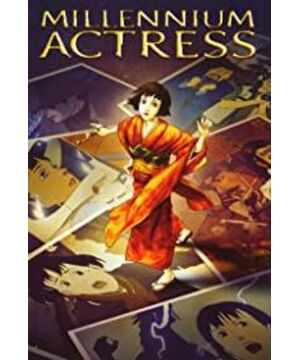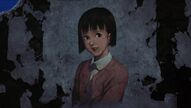The Millennium Actress is a combination of the two, and a subversion of the two. In terms of the main line of the narrative, this is a complete tragedy of classicism. From the two to Chiyoko's family, to the death of the protagonist, it happened in one day. Changes; and in the branch of memories, the interviewed duo ubiquitously complained and participated in the camera from the perspective of outsiders. The spark generated by the collision of the two timelines is the director's ambition, and the identity of the protagonist actor makes the film appear in the old house documentary filming, oral memories in the filming, and shooting on the set in the memory. The three dimensions are interspersed back and forth, often making People swallowed the emotion that just appeared, just because they couldn't tell whether it was a play, a dream or reality.
When Chiyoko was about to die, Gentaro confessed the fact that "the painter died early, and Chiyo pursued all his life only for illusions" in his eyes. And if Chiyoko died like this kindly and lovingly, maybe we would sigh her innocence, lament the impermanence of facts, the loneliness of life, and the joys and sorrows of the world. The beauty was destroyed in front of us when everything was mature. The audience watched the grand back of Chiyo leave with sadness, and the soul was baptized again.
But she just said the sentence at the end: "No matter what, I just love the journey of chasing him." At this time, the sad music disappeared, the picture turned black and white, and the black universe was swallowed by white light.
The weight of this sentence in this film is as if the audience made a big meal after a busy day, and was sitting on a plate ready to start, but was sprinkled with a pinch of salt by others who said: No matter whether the dish meets their own taste in the end, the difference between the dish and the dish is important. The views and the mood of eating food are always different. Of course, there cannot be and should not be only one explanation for the appearance of this sentence. Optimistic people see idealized existentialism, insistence on self-worth, and a philosophical redefinition of "owning" as a re-discussion of love and the true meaning of life. But this can't convince me that Jin Min's thousands of designs have sold a theme idea that can be clarified by a three-cent drama.
In my opinion, this sentence is actually the final blow to the idol. The thousand-year-old actress used Chiyoko as a carrier to show us the four characters of drama and dream life. What is a dream? Dream is the derivation of desire. The strongest form of desire is obsession, obsession, and love is just one of the more common types of obsessions. Chiyoko's desire for a painter led her to become an actress, and the character experiences in her acting career were intertwined into dreams and filled her life, turning desire into obsession and will into "reality". From the very beginning, the film has buried hidden lines and sidetracked. The painter's blurred face, always only has the back, the story background changes but always the same people set the same direction, Chiyoko's repeated words forever, the overlapping of time and space, the smooth replacement: all clues point to this is a dream. And Gentaro's lines, who are always moved by the side and burst into tears, are quite a trap: after listening to the sentence "No matter what, I only love the journey of chasing him." Wouldn't you doubt it? How much of Chiyoko's life in the drama is made up of the interpretations of these bystanders? Why are these other people moved by her irrational persistence? Does this kind of moving and intoxicating itself have some kind of desire orientation? Chiyoko has mostly feelings, sensibility and self-satisfaction towards the painter. The portraits of herself painted by the painter on the warehouse frequently appear, and I have to say that there are some hints of narcissus. And how did this feeling become her brilliance? For her persistence, the people around her paid a higher price than her. After all, for Chiyoko herself, all she did was to move her. From this, we have discovered the blindness in human sensibility, which is not only blind, but also not very glorious. But for thousands of years, people have been unable to escape the prison of sensibility, blindly repeating such a wheel of tragedy from generation to generation. The Greeks called it fate (Ananke), psychologists called it hysteria, and mortals called it beauty. Chiyoko is not unaware of this, but in dreams and plays, desire overpowers reason. So the old lady spinning thread often appeared in the play, satirizing Chiyoko's inaction and self-satisfaction, and in the last space play, the earthquake (reality) broke the dream of the play, the spinning old lady appeared again, Chiyoko understood, let reason take over, Covered with the portrait left by the painter, he lived a secluded life of reading books and planting grass.
Of course, this film has more to say than human nature.
Compared with Chihiro in the same year, in the same persistent journey, Chiyoko's image has also experienced growth, but because of the subversive form of the film, it is forced or designed to be scrutinized and human nature. answer. And the same jealousy, narcissism, greed, weakness, absurdity, loneliness, and domineering were all resolved by the bravery and tenacity of Chihiro and Bailong. Life is like a play, life is a play, and people are creatures who seek benefits and avoid harm, and have a natural yearning for light and heat. This is probably the reason why Chiyoko can only be hidden and Chihiro has become a thousand years.
View more about Millennium Actress reviews











